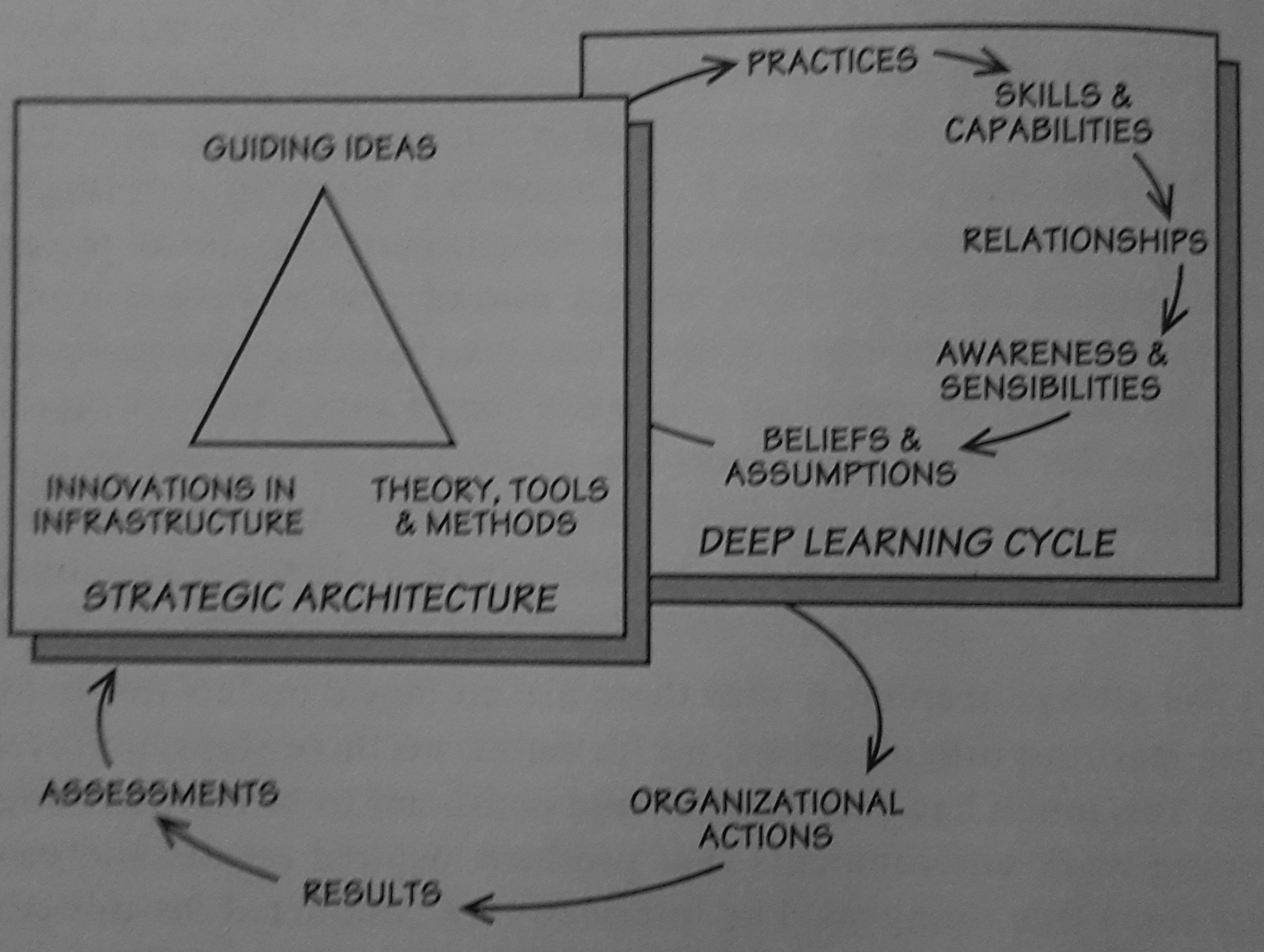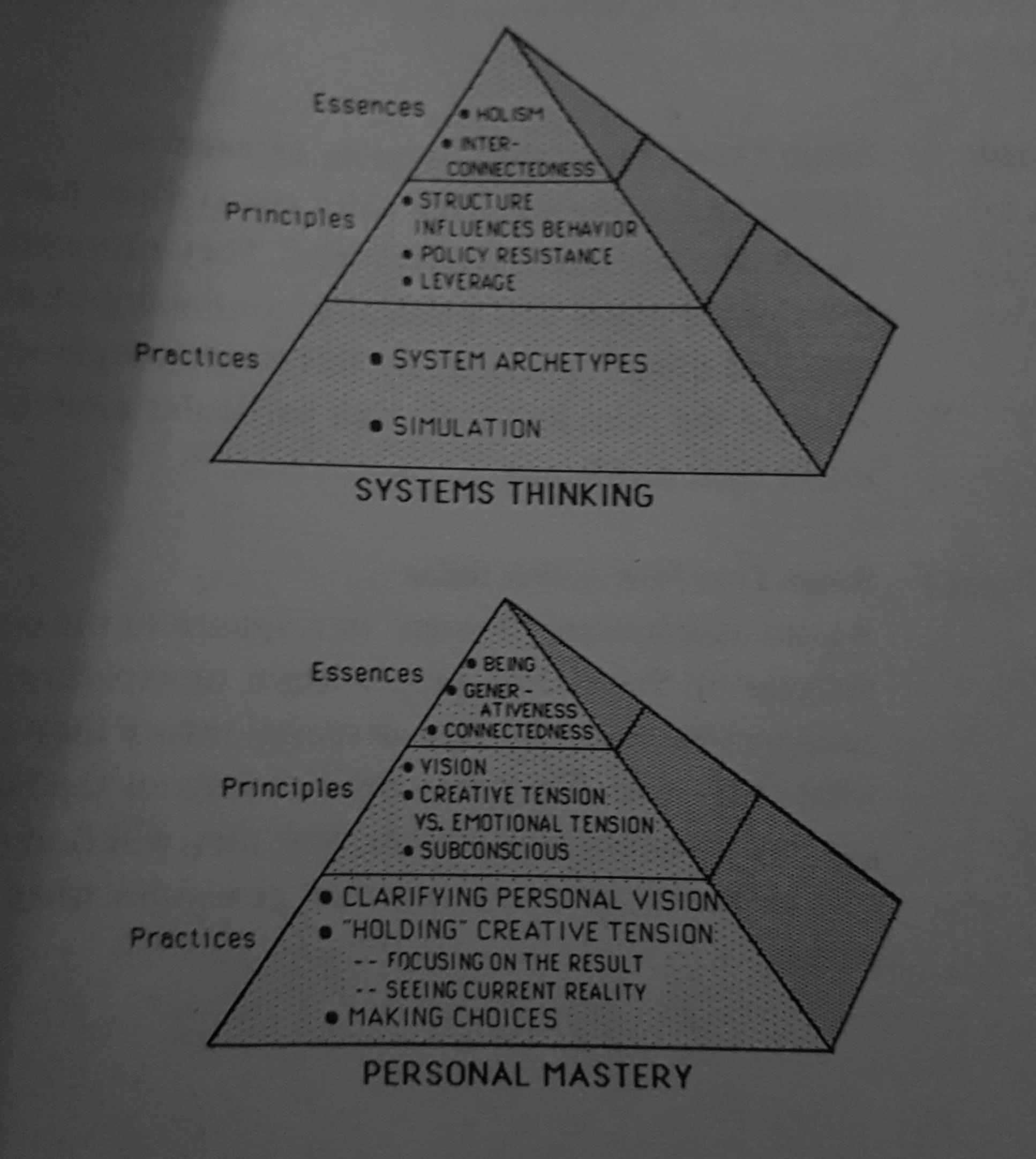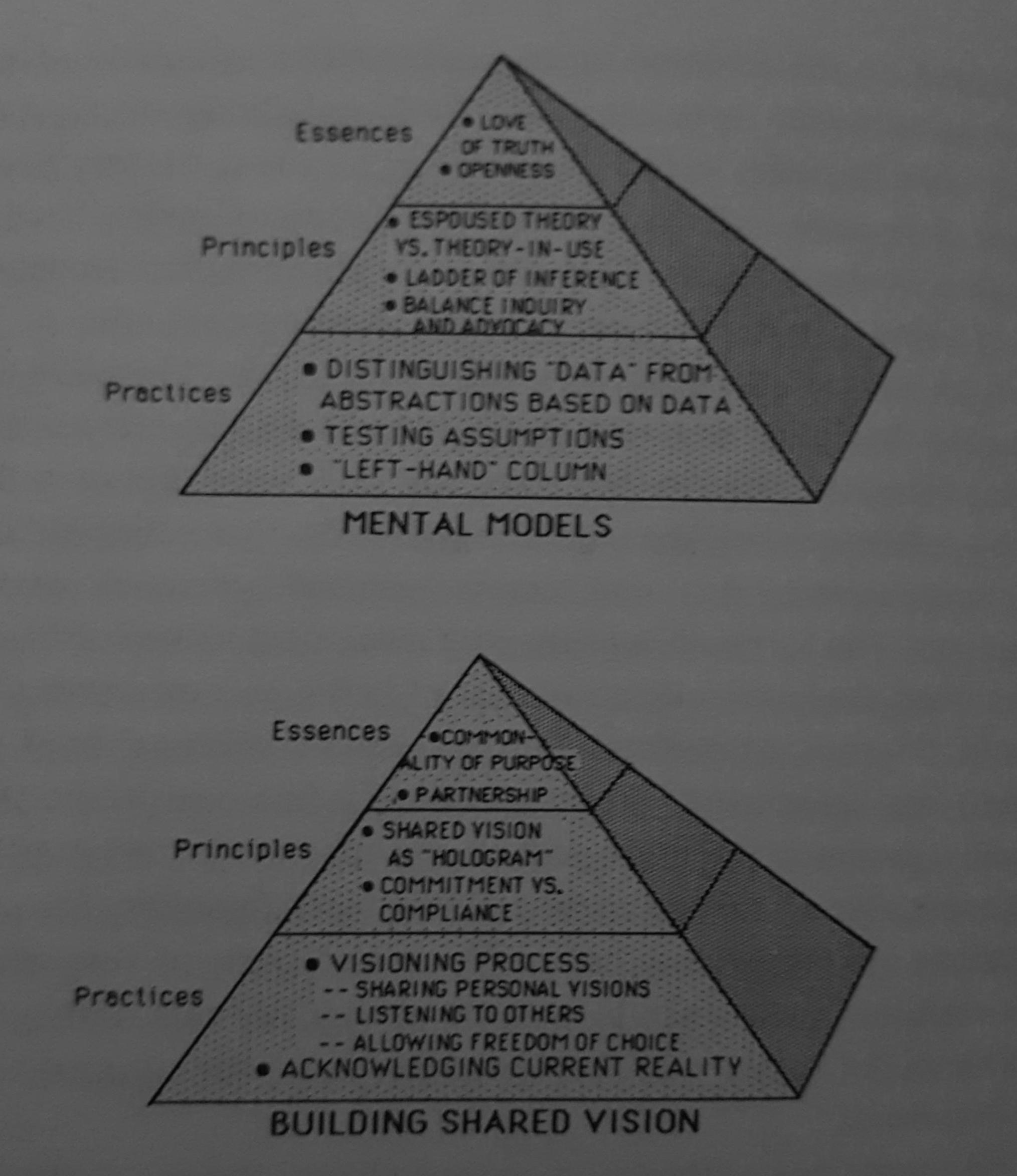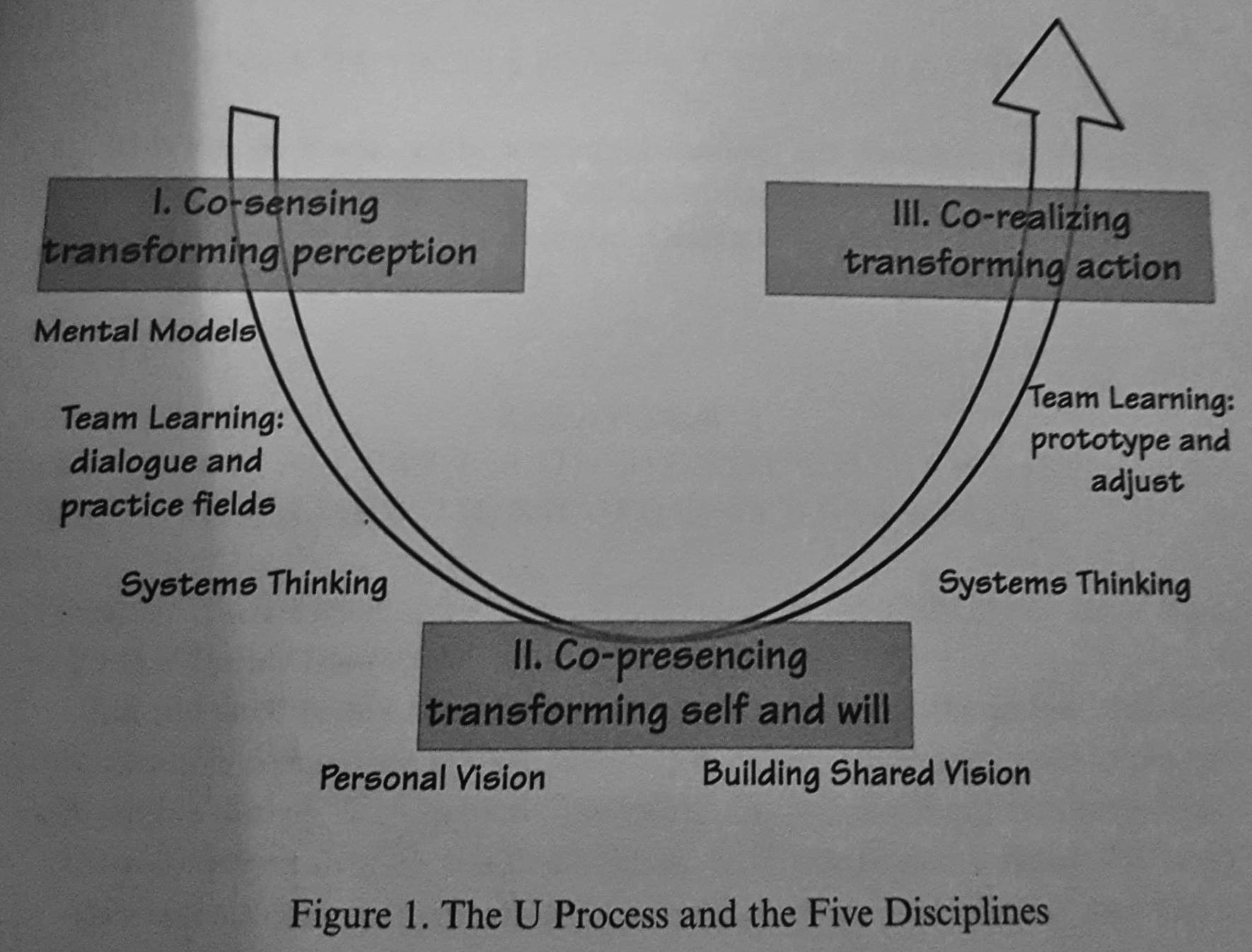Notes from The Fifth Discipline
Page 10:
The discipline of team learning starts with “dialogue”, the capacity of members of a team to suspend assumptions and enter into a genuine “thinking together.” To the Greeks dia-logos meant a free-flowing of ideas through a group, allowing the group to discover insights not attainable individually. Dialog differs from the more common “discussion”, which has its roots with “percussion” and “concussion”, literally a heaving of ideas back and forth in a winner-takes-all competition.
Page 54:
Interestingly, in the beer game and in many other systems, in order for you to succeed others must succeed as well.
Page 73:
The essence of the discipline of systems thinking lies in a shift of mind:
- seeing interrelationships rather than linear cause-effect chains, and
- seeing processes of change rather than snapshots
Page 73:
One of the reasons of this fragmentation in our thinking stems from our language. Language shapes perception. What we see depends on what we are prepared to see. Western languages, with their subject-verb-object structure, are biased toward a linear view. If we want to see systemwide interrelationships, we need a language of interrelationships, a language made up of circles.
Page 88:
In a classic article in the Sloan Management Review, Ray Stata, former CEO of Analog Devices and founder of the Massachusetts High Technology Council, wrote that “One of the highest leverage points for improving system performance, is the minimization of system delays.” … “The way leading companies manage time,” says George Stalk, vice president of the Boston Consulting Group, “- in production, in new product development, in sales and distribution - represents the most powerful new source of competitive disadvantage.”
Page 130:
Like Inamori, O’Brien arued that managers must redefine their job. They must give up “the old dogma of planning, organizing and controlling,” and realize “the almost sacredness of their responsibility for the lives of so many people.” Managers’ fundamental task, according to O’Brien, is “providing the enabling conditions for people to lead the most enriching lives they can.”
Page 136:
To empower people in an unaligned organization can be counterproductive. If people do not share a common vision, and do not share common mental models about the business reality within which they operate, empowering people will only increase ogranizational stress and the burden of management to maintain coherence and direction. … The ability to focus on ultimate intrinsic desires, not only on secondary goals, is a cornerstone of personal mastery. … George Bernard Shaw expressed the idea pointedly when he said:
This is the true joy in life, the being used for a purpose recognized by yourself as a migthy one … the being a force of nature instead of a feverish, selfish little clod of ailments and grievances complaining that the world will not devote itself to making you happy.
Page 150:
The power of the truth, seeing reality more and more as it is, cleansing the lens of perception, awakening from self-imposed distortions of reality - are different ecpressions of a common principle in almost all the world’s great philosophic and religious systems. Buddhist strive to achieve the state of “pure observation,” of seeing reality directly. Hindus speak of “witnessing,” observing themselves and their lives with an attitude of spiritual detachment. The power of the truth was no less central to early Christian thinking, although it has lost its place in Christian practice over the last two thousand years. In fact, the Hebrew symbols used to form the word Yeheshua, “Jesus,” include the symbols for Jehovah, with the additional letter shin intersted in the middle. The symbols for Jehovah carry the meaning “That which was, is, and will be.” The inserted _shin modifies the meaning to “that which was, is, and will be, _delivers.” This is the probable origin of the statement “The truth shall set you free.”
Page 185:
Now, I very often respond to differences of view by asking the other person to say more about his or her view, or to expand further on how they arrived at the view. Today I find that I spend very little time trying to convince people of my viw, and I can honestly say that it makes life a lot easierand more fun.
Page 186:
When advocating your view:
- Make your own reasoning explicit (i.e., say how you arrived at your view and the “data” on which it is based)
- Encourage others to explore your view (e.g., “Do you see any gaps in my reasoning?”)
- Encourage others to provide different views (i.e., “Do you have either different data or different conclusions, or both?”)
- Actively inquire into others’ views that differ from your own (i.e., “What are your views?” “How did you arrive at your view?” “Are you taking into account data that are different from what I have considered?”)
When inquiring into others’ views:
- If you are making assumptions about others’ views, state your assumptions clearly and acknowldge that they are assumptions
- State the “data” upon which your assumptions are based
- Don’t bother asking questions if you’re not genuinely interested in the others’ response (i.e., if you’re only trying to be polite or to show the others up)
When you arrive at an impasse (others no longer appear to be open to inquiring into their own views):
- Ask what data or logic might change their views
- Ask if there is any way you might together design an experiment (or some other inquiry) that might provide new information
Page 223:
By contrast with discussion, the word “dialogue” comes from the Greek Dialogos. Dia means through. Logos means the word, or more broadly, the meaning. Bohm suggests that the original meaning of dialogue was the “meaning passing or moving through … a free flow of meaning between people, in the sense of a stream that flows between two banks.” In dialogue, Bohm contends, a group accesses a larger “pool of common meaning,” which cannot be accessed individually. “The whole organizes the parts,” rather than trying to pull the parts into a whole.
Page 228:
Thinking of one another as colleagues is important because thought is participative. The conscious act of thinking of one another as colleagues contributes toward interacting as colleagues. … Fear and judgement must give way. Dialogue is playful; it requires the willingness to play with new ideas, to examine them and test them. As soon as we become overly concerned with “who said what,” or “not saying something stupid,” the playfulness will evaporate.
Page 229:
His understanding of dialogue allows him to influence the flow of development simply through participating. For example, after someone has made an overservation, the facilitator may say, “But the opposite may also be true.” Beyond such reminders of the condition for dialogue, the facilitator’s participation demonstrates dialogue. The artistry of dialogue lies in experiencing the flow of meaning and seeing the one thing that needs to be said now.
Page 271:
Looking back on their work, Allen and Sandow concluded, “As the philosophy of the physical sciences dominated the Industrial Age, the philosophy of the biological sciences is beginning to dominate the Knowledge Age. This philosophy views knowledge, people, and organizations as living systems … [which representas a shift from] (1) focusing on parts to focusing on the whole, (2) focusing on categorization to focusing on integration, (3) focusing on individuals to focusing on interactions, and (4) focusing on systems outside the observer to focusing on systems that include the observer.”
Page 284:

Page 328:
The hallmark of good design is the absence of crisis - not a good way to get attention in a “leaders are heroes” organization culture. Those who aspire to lead out of a desire to control, to gain fame, or simply to be at the center of the action will find little to attract them to the quiet design work of leadership.
Page 335:
Nature, according to Maturana, conserves a few basic features, and in so doing frees everything else to change. … Change leaders often forget to ask a powerful question: “What do we seek to conserve?” Change naturally induces fear in us all: fear of the unkown, of failure, of not being needed in a new order of things. When we obsessively focus only on what needs to be changed, and not on what we intend to conserve, we reinforce these fears. But when we can clarify what we intend to conserve, some of this fear can be released.
Page 339:
The word charism comes from the Catholic church, where it means one’s distinctive personal “gifts,” given by the Holy Spirit. To be charismatic, then, means to develop one’s gifts. In short, we develop as true charismatic leaders to the extent that we become ourselves. Herein lies the secret of real leadership development.
Page 385:


Page 402:
